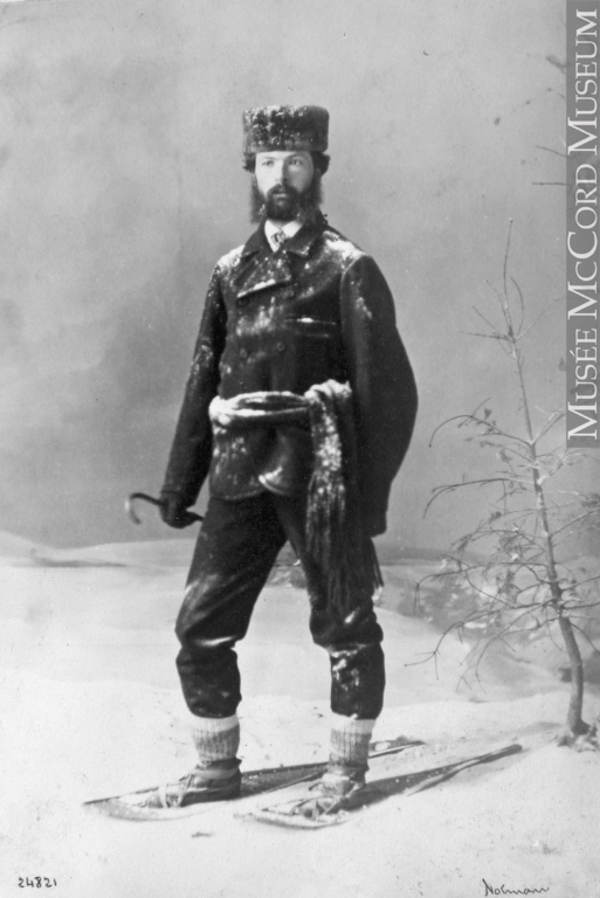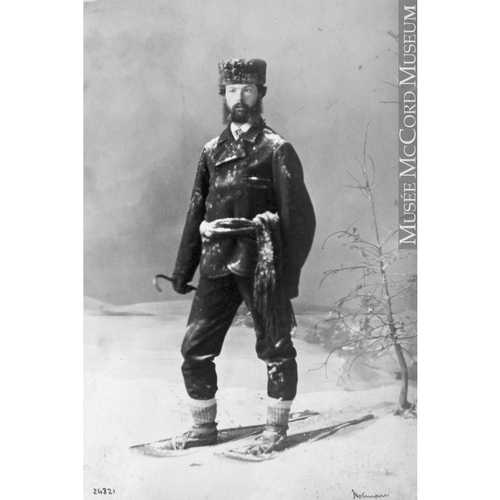
Source: Link
LANG (Laing), GEORGE, mason and builder; b. c. 1821 in Roxburghshire (now part of Borders), Scotland; m. in 1844 Susan Johnston in Edinburgh, and they had no children; d. 2 July 1881 at Shubenacadie, Hants County, N.S.
Trained in Scotland as a mason, George Lang is said to have worked on the Scott Monument in Edinburgh, erected between 1841 and 1846, and then to have immigrated to St John’s, Nfld, to work on the Anglican cathedral constructed between 1847 and 1850. There he may have met David Stirling, an architect from Roxburghshire, and worked with him on buildings erected after the great fire of 1846. In 1851 Lang and Stirling began operating the Albert Freestone Quarries in Albert County, N.B., where Lang remained as manager until 1858. Financed and promoted by Charles Dickson Archibald* and British associates, the quarries supplied sandstone – the popular brownstone of New York – to the American market.
In 1858 Lang moved to Halifax, where he successfully tendered on principal government and commercial contracts. These works made him one of the leading Halifax builders of the early 1860s. His first building was the Halifax County Court House, designed by William Thomas* of Toronto and erected between 1858 and 1860. Lang’s second commission, a monument in St Paul’s Cemetery, commemorated Halifax’s fallen sons of the Crimean War, especially Augustus Frederick Welsford and William B. C. A. Parker. Lang repeated the monument’s lion motif on several later buildings. His third undertaking involved four important contracts for rebuilding Granville Street after the destructive fire of September 1859.
Although Lang erected other stores and offices in 1862–63, his building activities were largely institutional and governmental. In 1860–61 he undertook work for the British army at Fort Massey and the Wellington Barracks in Halifax, and in 1862 for the Church of England at St Luke’s School House in Halifax and with the hall and library of King’s College, Windsor. In 1862–63 he built the impressive Halifax Club, designed by Stirling.
Unlike his principal competitors, Lang was not involved in building houses and tenements on speculation. In 1863, again with Stirling, he built Keith Hall for the brewer and politician, Alexander Keith*, and a group of cottages in Bowery Street; in 1864 Lang constructed the Quinlan House. His experiments with patent roofing, his periodic but unsuccessful tenders, and his purchase of building lots, mainly in 1864, suggest that it was promising opportunity elsewhere rather than lack of interest which kept Lang largely out of the busy domestic construction field.
Early in 1864 Lang’s low tender won the contract for the new Provincial Building, designed by Stirling, to house the customs department and post office. Lang began ambitiously with the purchase of a 40-horsepower steam-engine. Soon, however, he encountered labour combinations, critical commissioners, and financial over extension. By August 1865 it was “rumoured that each separate brick and stone is to be marked with the date of the year it was put in.” Later in 1865, after having assigned all his property to his principal creditor, James Forman*, Lang was relieved of the contract. The slate quarry, financed by Forman, which he had opened in 1863 at Douglas (Douglas Road), Hants County, was turned over with his other assets.
For his remaining 15 years Lang operated a brick manufactory in Shubenacadie, initially with Halifax carpenter James Thompson. An honorary member of the North British Society from 1858, Lang served as a volunteer in the Chebucto Greys from 1860 to 1865 and as vice-president of the Caledonia Curling Club in 1862. The Nova Scotia building stones he collected and displayed at the international exhibitions of 1862 (London) and 1865 (Dublin) won him honorary mention at the latter.
A builder’s situation in mid-19th-century Halifax was continually unstable. Although Lang’s ambition, energy, and skills proved insufficient to establish him permanently in this precarious milieu, a number of his buildings and his Crimean War monument survive today.
Colchester County Court of Probate (Truro, N.S.), Original estate papers, 1880, no.921 (mfm. at PANS). General Register Office (Edinburgh), Registers for St Cuthbert’s Church, Edinburgh, 12 Aug. 1844. Halifax County Registry of Deeds (Halifax), Deeds, 1861–81 (mfm. at PANS). PANS, MS file, Halifax – Provincial Building (new); RG 39C, nos. 1278, 1281–82, 1314–15, 1515, 1653–54, 3155, 3631, 4390, 4426. QUA, David Stirling, Notebook (copy at PANS). St Paul’s Anglican Church (Halifax), Registers of baptisms, burials, and marriages, 6 July 1881 (mfm. at PANS). Westmorland County Registry Office (Dorchester, N.B.), libro E: f.530; F: 71; G: 25 (mfm. at PANB). Duncan Campbell, Nova Scotia, in its historical, mercantile and industrial relations (Montreal, 1873), 390–92. N.S., Statutes, 1854, c.68; 1857–58, c.70. N.S., House of Assembly, Journal and proc., 1860; 1864; 1866; 1869. Acadian Recorder, 9 Oct. 1858; 28 May, 24 Dec. 1859; 2 Aug. 1862; 19 Dec. 1863; 6 Feb., 10 Dec. 1864; 26 Aug. 1865; 20 Jan. 1866; 24 Aug., 15 Sept. 1870; 6 July 1881. British Colonist (Halifax), 4 Feb., 19 June 1862; 31 Dec. 1863. Evening Express (Halifax), 31 Dec. 1859; 13 Nov. 1861; 28 March, 21 May, 20 June, 25 July, 12 Sept., 29 Oct. 1862; 29 April, 4 May, 15 June, 9 Nov. 1863; 13, 15 Jan., 3 Feb., 23 March, 20 April, 4 May, 5 Dec. 1864; 27 March, 5 April, 23 June, 22, 24 Nov., 8 Dec. 1865. Halifax Reporter, 3, 24 Nov. 1860; 11 June 1864. Morning Journal (Halifax), 27 June 1864. Morning News (Saint John, N.B.), 8 May 1854. Novascotian, 13 Sept., 25 Oct. 1858; 31 Oct., 26 Dec. 1859; 2 Jan., 25 June, 16 July 1860. Belcher’s farmer’s almanack, 1862. The Halifax, N.S. business directory . . . , comp. Luke Hutchinson (Halifax), 1863. Hutchinson’s N. S. directory, 1864–65. Lovell’s N.S. directory, 1871: 361. McAlpine’s Maritimes provinces business directory . . . (Saint John and Halifax), 1880–81: 250, 465. North British Soc., Annals of the North British Society of Halifax, Nova Scotia, for one hundred and twenty-five years . . . , comp. J. S. Macdonald (Halifax, 1894). Harry Piers, “Artists in Nova Scotia,” N.S. Hist. Soc., Coll., 18 (1914): 160.
Cite This Article
Susan Buggey, “LANG (Laing), GEORGE,” in Dictionary of Canadian Biography, vol. 11, University of Toronto/Université Laval, 2003–, accessed January 3, 2025, https://www.biographi.ca/en/bio/lang_george_11E.html.
The citation above shows the format for footnotes and endnotes according to the Chicago manual of style (16th edition). Information to be used in other citation formats:
| Permalink: | https://www.biographi.ca/en/bio/lang_george_11E.html |
| Author of Article: | Susan Buggey |
| Title of Article: | LANG (Laing), GEORGE |
| Publication Name: | Dictionary of Canadian Biography, vol. 11 |
| Publisher: | University of Toronto/Université Laval |
| Year of publication: | 1982 |
| Year of revision: | 1982 |
| Access Date: | January 3, 2025 |



